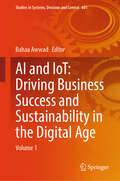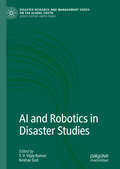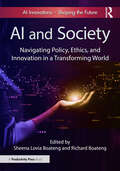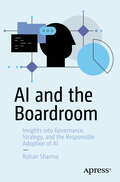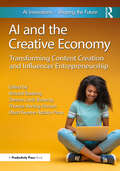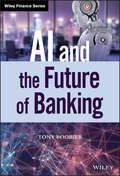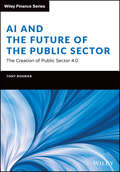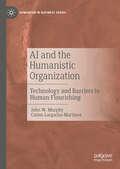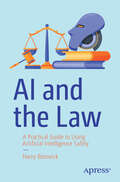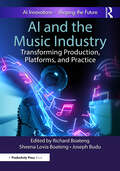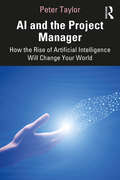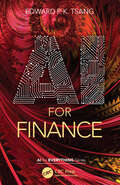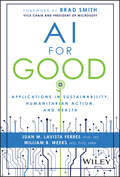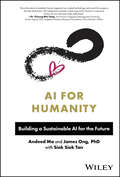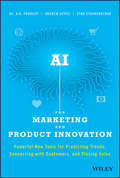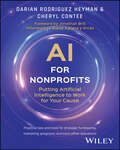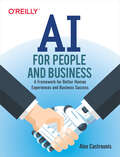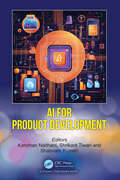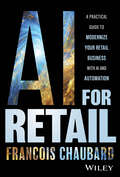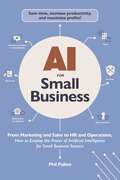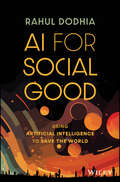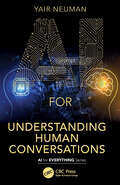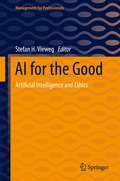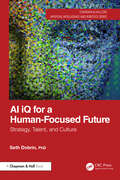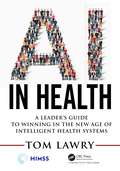- Table View
- List View
AI and IoT: Volume 1 (Studies in Systems, Decision and Control #601)
by Bahaa AwwadThis book explores the integration of AI technologies with emerging trends such as IoT, blockchain, and cloud computing. In this book readers will embark on a transformative journey that explores the powerful convergence of Artificial Intelligence (AI), Internet of Things (IoT), and business management. With the advent of these cutting-edge technologies, businesses have unprecedented opportunities to revolutionize their operations, drive innovation, and achieve remarkable success in today's digital landscape.
AI and Robotics in Disaster Studies (Disaster Research and Management Series on the Global South)
by T. V. Vijay Kumar Keshav SudThis book promotes a meaningful and appropriate dialogue and cross-disciplinary partnerships on Artificial Intelligence (AI) in governance and disaster management. The frequency and the cost of losses and damages due to disasters are rising every year. From wildfires to tsunamis, drought to hurricanes, floods to landslides combined with chemical, nuclear and biological disasters of epidemic proportions has increased human vulnerability and ecosystem sustainability. Life is not as it used to be and governance to manage disasters cannot be a business as usual. The quantum and proportion of responsibilities with the emergency services has increased many times to strain them beyond their human capacities. Its time that the struggling disaster management services get supported and facilitated by new technology of combining Artificial Intelligence (AI) and Machine Learning (ML) with Data Analytics Technologies (DAT)to serve people and government in disaster management. AI and ML have advanced to a state where they could be utilized for many operations in disaster risk reduction. Even though many disasters cannot be prevented and a number of them are blind natural disasters yet through an appropriate application of AI and ML quick predictions, vulnerability identification and classification of relief and rescue operations could be achieved.
AI and Society: Navigating Policy, Ethics, and Innovation in a Transforming World
by Richard Boateng Sheena Lovia BoatengIn recent years, the profound impact of artificial intelligence (AI) on fostering new forms of entrepreneurship has become increasingly evident. Entrepreneurs worldwide are harnessing the capabilities of AI to develop innovative solutions and create businesses that address pressing challenges.Despite the growing recognition of AI’s potential, there exists a crucial need to deepen understanding and awareness surrounding how individuals are leveraging AI to establish novel ventures. Many entrepreneurs are pioneering initiatives that deploy AI technologies to tackle complex problems. This challenge revolves around the imperative to explore, document, and comprehend the diverse ways in which AI is driving the emergence of new businesses, solving real-world problems, and reshaping the entrepreneurial landscape. It underscores the necessity for entrepreneurs, researchers, and the wider community to grasp the transformative role of AI in fostering innovation and enabling the creation of businesses dedicated to addressing societal issues. Addressing this challenge will contribute to a more comprehensive understanding of the synergy between AI and entrepreneurship, paving the way for informed and impactful ventures that leverage the full potential of AI technologies.This book addresses the broader societal implications of AI, focusing on policy, education, and ethical considerations. It reviews national AI policies in Africa, explores AI-powered innovation in STEM education, and investigates the use of AI in fraudulent activities. It also discusses the integration of AI in the transport sector of developing countries, highlighting its potential to revolutionize infrastructure and services. In addition, it provides a holistic view of AI’s impact on society, emphasizing the need for ethical guidelines, regulatory frameworks, and continuous learning to harness AI responsibly. In a comparative analysis, it presents an exploration into the landscape of top-rated AI freelancers across Europe, North America, and South America, focusing on the intersection of gender and professional success in this burgeoning sector. It concludes with a discussion on the role of AI in the future of accounting in emerging economies.
AI and the Boardroom: Insights into Governance, Strategy, and the Responsible Adoption of AI
by Rohan SharmaDevelop and implement AI strategies aligned with business goals, including operating models and partnership strategies. This book is practical guide for chief experience officers and other corporate board members faced with the complex issues of AI governance, data privacy, AI regulations, AI copyright, AI strategy, and more. Executives are eager to hear from other executives, peers, and authority figures regarding AI matters, and how to approach them quickly, correctly and meaningfully. The cost of missing out or messing up in AI transformation is easy so it’s imperative that C-suite and board members have the right mental framework to ask the right questions for their organizations. Throughout this book, you’ll see how to develop and execute AI strategies that align with your organizational goals and ethical standards. You’ll navigate the complex landscape of AI regulation and governance, applying best practices to ensure compliance and protect stakeholder interests. You’ll also, understand how to innovate and adapt AI technologies within your operations. AI and the Boardroom provides all the right tools to guide decision-making, foster partnerships, and enhance customer experiences What You Will Learn Master AI governance, regulations, and ethical considerations, including privacy and intellectual property issues. Optimize AI investments, budgets, and ROI through effective KPIs, OKRs, and risk management. Navigate organizational changes brought by AI, including executive compensation, team structures, and change management. Leverage AI for board-level decision-making while advancing organizational AI maturity and staying ahead of emerging trends. Who This Book Is For Suite executives and corporate board members; technology and innovation leaders; risk management and compliance professionals; corporate strategists and business unit leaders; AI program managers and data scientists
AI and the Creative Economy: Transforming Content Creation and Influencer Entrepreneurship
by Richard Boateng Thomas Anning-Dorson Sheena Lovia Boateng Obed Kwame Adzaku PenuIn recent years, the profound impact of artificial intelligence (AI) on fostering new forms of entrepreneurship has become increasingly evident. Entrepreneurs worldwide are harnessing the capabilities of AI to develop innovative solutions and create businesses that address pressing challenges.Despite the growing recognition of AI’s potential, there exists a crucial need to deepen understanding and awareness surrounding how individuals are leveraging AI to establish novel ventures. Many entrepreneurs are pioneering initiatives that deploy AI technologies to tackle complex problems. This challenge revolves around the imperative to explore, document, and comprehend the diverse ways in which AI is driving the emergence of new businesses, solving real-world problems, and reshaping the entrepreneurial landscape. It underscores the necessity for entrepreneurs, researchers, and the wider community to grasp the transformative role of AI in fostering innovation and enabling the creation of businesses dedicated to addressing societal issues. Addressing this challenge will contribute to a more comprehensive understanding of the synergy between AI and entrepreneurship, paving the way for informed and impactful ventures that leverage the full potential of AI technologies.In this respect, the purpose of this book is to offer an in-depth exploration of the intersection between AI and entrepreneurial ventures. The book aims to provide a contemporary and thorough analysis of how AI is playing a pivotal role in shaping new forms of entrepreneurship across various industries. It seeks to illuminate the ways in which entrepreneurs are leveraging AI technologies to drive innovation, address challenges, and create businesses that contribute to societal progress.Focusing on the intersection of AI and the creative economy, this book examines the role of AI in content creation, social media, and influencer entrepreneurship. It provides a snapshot of current research, identifies gaps in knowledge, and presents case studies of content creators who have successfully integrated AI into their workflows. This book highlights the impact of AI on various forms of content creation, including educational, lifestyle, health, and entertainment content. It also includes a comprehensive syllabus for training entrepreneurs on leveraging AI for content creation, emphasizing the balance between technological advancements and maintaining authenticity.
AI and the Future of Banking (Wiley Finance)
by Tony BoobierAn industry-specific guide to the applications of Advanced Analytics and AI to the banking industry Artificial Intelligence (AI) technologies help organisations to get smarter and more effective over time – ultimately responding to, learning from and interacting with human voices. It is predicted that by 2020, half of all businesses will be using these intelligent, self-learning systems. Across its entire breadth and depth, the banking industry is at the forefront of investigating Advanced Analytics and AI technology for use in a broad range of applications, such as customer analytics and providing wealth advice for clients. AI and the Future of Banking provides new and established banking industry professionals with the essential information on the implications of data and analytics on their roles, responsibilities and personal career development. Unlike existing books on the subject which tend to be overly technical and complex, this accessible, reader-friendly guide is designed to be easily understood by any banking professional with limited or no IT background. Chapters focus on practical guidance on the use of analytics to improve operational effectiveness, customer retention and finance and risk management. Theory and published case studies are clearly explained, whilst considerations such as operating costs, regulation and market saturation are discussed in real-world context. Written by a recognised expert in AI and Advanced Analytics, this book: Explores the numerous applications for Advanced Analytics and AI in various areas of banking and finance Offers advice on the most effective ways to integrate AI into existing bank ecosystems Suggests alternative and complementary visions for the future of banking, addressing issues like branch transformation, new models of universal banking and ‘debranding’ Explains the concept of ‘Open Banking,’ which securely shares information without needing to reveal passwords Addresses the development of leadership relative to AI adoption in the banking industry AI and the Future of Banking is an informative and up-to-date resource for bank executives and managers, new entrants to the banking industry, financial technology and financial services practitioners and students in postgraduate finance and banking courses.
AI and the Future of the Public Sector: The Creation of Public Sector 4.0 (Wiley Finance)
by Tony BoobierDiscover how data, analytics, and AI will transform public services for the better In AI and the Future of the Public Sector: The Creation of Public Sector 4.0, renowned executive and consultant Tony Boobier delivers a comprehensive reference of the most relevant and central issues regarding the adoption and implementation of AI in the public sector. In the book, you&’ll find out why data and analytics are the solution to significant and ongoing problems in the public service relating to its ability to effectively provide services in an environment of reduced funding. You&’ll also discover the likely impact of future technological developments, like 5G and quantum computing, as well as explore the future of healthcare and the effective digitalization of the healthcare industry. The book also offers: Discussions of policing 4.0 and how data and analytics will transform public safety Explorations of the future of education and how ai can dramatically enhance educational standards while reducing costs Treatments of the internationalization of public services and its impact on agencies and departments everywhereA can&’t-miss resource for public sector employees at the managerial and professional levels, AI and the Future of the Public Sector is an insightful and timely blueprint to the effective use of artificial intelligence that belongs in the bookshelves of policy makers, academics, and public servants around the world.
AI and the Humanistic Organization: Technology and Barriers to Human Flourishing (Humanism in Business Series)
by John W. Murphy Carlos Largacha-MartinezMany workers already report that they are alienated from their jobs and find their workplaces to be stifling or uninviting and expect that the introduction of new technologies, including AI, will only worsen their organizational culture. This book outlines the need for a humane and responsible approach to technology, so that employees are not further disengaged from the workplace. This shift in approach should mean that when AI is introduced into an organization, workers have a central role in the design, implementation, and evaluation of this technology. Computer technology can thus promote human flourishing instead of contributing to alienation and security in workplaces. This book is a throwback to a time when high theory was an important part of discussions about computer technology. It brings together diverse disciplines to interrogate some important issues facing the development and application of AI, ultimately concluding that this technology is currently being guided by the wrong theory and a humanistic perspective is needed to access its full potential. The ideas presented will be of great interest to scholars and students of AI who focus on the workplace, organizational behavior, and business ethics.
AI and the Law: A Practical Guide to Using Artificial Intelligence Safely
by Harry BorovickLearn how to maximize your use of, and benefit from AI, personally and professionally while staying safe. To satisfy professionals and businesses trying to modernize their approaches to work and personal tasks, this book will explain some of the basics of what AI is, what AI is likely to look like in the near future, and how not to get stung using it. You’ll quickly realize that AI isn’t coming, it’s here, along with its opportunities and challenges. While some of the advantages of using AI tools may seem too good to be true, you’ll discover that the key to navigating the early stages of the AI era is to understand its guiding principles and then to prioritize the guidelines. The book features general situations and use cases to help you experience AI for fun and for work while retaining the benefits, profits, creations, outputs, and efficiencies of it. If you’re going to use AI in your daily career, whether as a student, creative, executive, marketer or in sales this book will help you understand how to bypass obstacles and get value from AI with the guidance of an AI and tech lawyer. What You Will Learn Identify, debunk, and protect against business and legal risk in the AI eraDiscuss these issues on a high level with CTOs and COOsSee how professionals can mutually use AI to their benefit Who This Book is For Anyone who wants to know whether AI is really going to change the world through the lens of their industry, or to simply understand how AI can be safely harnessed to maximize daily value while minimizing practical risks.
AI and the Music Industry: Transforming Production, Platforms, and Practice
by Richard Boateng Sheena Lovia Boateng Joseph BuduIn recent years, the profound impact of artificial intelligence (AI) on fostering new forms of entrepreneurship has become increasingly evident. Entrepreneurs worldwide are harnessing the capabilities of AI to develop innovative solutions and create businesses that address pressing challenges.Despite the growing recognition of AI’s potential, there exists a crucial need to deepen understanding and awareness surrounding how individuals are leveraging AI to establish novel ventures. Many entrepreneurs are pioneering initiatives that deploy AI technologies to tackle complex problems. This challenge revolves around the imperative to explore, document, and comprehend the diverse ways in which AI is driving the emergence of new businesses, solving real-world problems, and reshaping the entrepreneurial landscape. It underscores the necessity for entrepreneurs, researchers, and the wider community to grasp the transformative role of AI in fostering innovation and enabling the creation of businesses dedicated to addressing societal issues. Addressing this challenge will contribute to a more comprehensive understanding of the synergy between AI and entrepreneurship, paving the way for informed and impactful ventures that leverage the full potential of AI technologies.This book delves into the transformative impacts of AI on the music industry. It reviews trends in digital platforms and music research, the integration of AI in music production, and the experiences of artists and music publishers using AI. It presents a comparative analysis of AI adoption patterns in the music industry and provides practical insights into the use of AI tools for music production and distribution. Additionally, it offers a detailed syllabus for training music industry stakeholders on harnessing AI technologies, illustrating the significant role AI plays in shaping the future of music.
AI and the Project Manager: How the Rise of Artificial Intelligence Will Change Your World
by Peter TaylorEnabling project managers to adapt to the new technology of artificial intelligence, this first comprehensive book on the topic discusses how AI will reinvent the project world and allow project managers to focus on people. Studies show that by 2030, 80 percent of project management tasks, such as data collection, reporting, and predictive analysis, will be carried out by AI in a consistent and efficient manner. This book sets out to explore what this will mean for project managers around the world and equips them to embrace this technological advantage for greater project success. Filled with insights and examples from tech providers and project experts, this book is an invaluable resource for PMO leaders, change executives, project managers, programme managers, and portfolio managers. Anyone who is part of the global community of change and project leadership needs to accept and understand the fast- approaching AI technology, and this book shows how to use it to their advantage.
AI for Finance (AI for Everything)
by Edward P. TsangFinance students and practitioners may ask: can machines learn everything? Could AI help me? Computing students or practitioners may ask: which of my skills could contribute to finance? Where in finance should I pay attention? This book aims to answer these questions. No prior knowledge is expected in AI or finance. To finance students and practitioners, this book will explain the promise of AI, as well as its limitations. It will cover knowledge representation, modelling, simulation and machine learning, explaining the principles of how they work. To computing students and practitioners, this book will introduce the financial applications in which AI has made an impact. This includes algorithmic trading, forecasting, risk analysis portfolio optimization and other less well-known areas in finance. This book trades depth for readability. It aims to help readers to decide whether to invest more time into the subject. This book contains original research. For example, it explains the impact of ignoring computation in classical economics. It explains the relationship between computing and finance and points out potential misunderstandings between economists and computer scientists. The book also introduces Directional Change and explains how this can be used.
AI for Good: Applications in Sustainability, Humanitarian Action, and Health
by Juan M. Lavista Ferres William B. WeeksDiscover how AI leaders and researchers are using AI to transform the world for the better In AI for Good: Applications in Sustainability, Humanitarian Action, and Health, a team of veteran Microsoft AI researchers delivers an insightful and fascinating discussion of how one of the world’s most recognizable software companies is tacking intractable social problems with the power of artificial intelligence (AI). In the book, you’ll learn about how climate change, illness and disease, and challenges to fundamental human rights are all being fought using replicable methods and reusable AI code. The authors also provide: Easy-to-follow, non-technical explanations of what AI is and how it works Examinations of how healthcare is being improved, climate change is being addressed, and humanitarian aid is being facilitated around the world with AI Discussions of the future of AI in the realm of social benefit organizations and efforts An essential guide to impactful social change with artificial intelligence, AI for Good is a must-read resource for technical and non-technical professionals interested in AI’s social potential, as well as policymakers, regulators, NGO professionals, and, and non-profit volunteers.
AI for Humanity: Building a Sustainable AI for the Future
by Andeed Ma James Ong Siok Siok TanCapture the value of cutting-edge AI while mitigating its most salient risks AI For Humanity: Building a Sustainable AI for the Future delivers an incisive and timely discussion of how to design, build, and implement cutting-edge AI in for-profit firms and other organizations in a responsible, sustainable, and ethical way. The book walks you through the three pillars of human-focused AI development—governance, technology, and commercialization—and dives deep into each one, showing you how to create AI products and services that better humanity and advance universally held values. You'll find methodologies and frameworks that mitigate against some of the most profound and unsettling risks of unchecked artificial intelligence development, and roadmaps to help you avoid the numerous pitfalls and traps awaiting unsuspecting companies, managers, and executives. You'll also discover: Real-world case studies, from companies including SAP, Huawei, and Tencent, demonstrating the actual dilemmas and questions firms face when developing and implementing this extraordinary tech Actionable commitments you can make to help ensure you and your company avoid the ethical and reputational risks associated with AI Strategies for AI product and service development consistent with sustainable growth Perfect for managers, executives, directors, and other business leaders with a stake in responsible artificial intelligence design, development, and implementation, AI For Humanity will also interest regulators, academics, thought leaders, and policy makers doing their best to capture AI's substantial potential value while mitigating its most serious risks.
AI for Marketing and Product Innovation: Powerful New Tools for Predicting Trends, Connecting with Customers, and Closing Sales
by A. K. Pradeep Stan Sthanunathan Andrew AppelGet on board the next massive marketing revolution AI for Marketing and Product Innovation offers creatives and marketing professionals a non-tech guide to artificial intelligence (AI) and machine learning (ML)—twin technologies that stand poised to revolutionize the way we sell. The future is here, and we are in the thick of it; AI and ML are already in our lives every day, whether we know it or not. The technology continues to evolve and grow, but the capabilities that make these tools world-changing for marketers are already here—whether we use them or not. This book helps you lean into the curve and take advantage of AI’s unparalleled and rapidly expanding power. More than a simple primer on the technology, this book goes beyond the “what” to show you the “how”: How do we use AI and ML in ways that speak to the human spirit? How to we translate cold technological innovation into creative tools that forge deep human connections? Written by a team of experts at the intersection of neuroscience, technology, and marketing, this book shows you the ins and outs of these groundbreaking technological tools. Understand AI and ML technology in layman’s terms Harness the twin technologies unparalleled power to transform marketing Learn which skills and resources you need to use AI and ML effectively Employ AI and ML in ways that resonate meaningfully with customers Learn practical examples of how to reinvest product innovation, brand building, targeted marketing and media measurement to connect with people and enhance ROI Discover the true impact of AI and ML from real-world examples, and learn the thinking, best practices, and metrics you need to capture this lightning and take the next massive leap in the evolution of customer connection. AI for Marketing and Product Innovation shows you everything you need to know to get on board.
AI for Nonprofits: Putting Artificial Intelligence to Work for Your Cause
by Darian Rodriguez Heyman Cheryl ConteeA collection of actionable AI tools you can apply immediately to help your nonprofit drive social impact and change In AI for Nonprofits: Putting Artificial Intelligence to Work for Your Cause, a team of leading nonprofit experts and social entrepreneurs delivers a startlingly insightful, strategic “how-to guide” for nonprofit and foundation leaders, board members, and volunteers, as well as higher education professionals and social entrepreneurs looking to deploy and integrate artificial intelligence tailored to their organization's mission and needs. It's the leading reference guide for people who are entirely new to AI, as well as tech-savvy veterans with a deep understanding of artificial intelligence looking for proven, hands-on techniques they can apply immediately to transform their nonprofits. Each chapter is based on interviews conducted with 57 of the nonprofit industry's most innovative and reputed voices. Together, they provide the latest strategies and tactics for nonprofit generative AI and predictive analytics applications, skills and competencies needed to effectively use this new technology, tips, tools, best practices, resource reviews, and the most common pitfalls to avoid. AI for Nonprofits walks you through exactly how to strategically customize artificial intelligence to improve your fundraising and resource development efforts, marketing and community engagement, program delivery, and back-office operations. From human resources management to program strategy, social listening, and donor research, the book provides the on-the-ground techniques you need to deploy to transform your nonprofit's operations. Inside the book: Step-by-step frameworks and actionable roadmaps to help you implement AI for content creation, donor engagement, and developing personalized messages at scale How to protect your donors' privacy and data with policies and practices that comply with rapidly shifting legal and regulatory landscapes Cutting-edge research and practical case studies drawn from real-world situations that illustrate concrete AI applications Access to 100+ tools, platforms, and providers focused on helping nonprofits optimize their use of AI AI for Nonprofits explains how to supercharge your organization's fundraising pipeline, marketing and community engagement, program delivery, back-office operations, and governance policies. It's perfect for nonprofit executives, managers, professionals, and leaders, AI for Nonprofits will also earn a place in the libraries of anyone with an interest in using AI to power social impact and change.
AI for People and Business: A Framework for Better Human Experiences and Business Success
by Alex CastrounisIf you're an executive, manager, or anyone interested in leveraging AI within your organization, this is your guide. You'll understand exactly what AI is, learn how to identify AI opportunities, and develop and execute a successful AI vision and strategy. Alex Castrounis,founder and CEO of Why of AI, Northwestern University Adjunct, advisor, and former IndyCar engineer and data scientist, examines the value of AI and shows you how to develop an AI vision and strategy that benefits both people and business.AI is exciting, powerful, and game changing--but too many AI initiatives end in failure. With this book, you'll explore the risks, considerations, trade-offs, and constraints for pursuing an AI initiative. You'll learn how to create better human experiences and greater business success through winning AI solutions and human-centered products.Use the book's AIPB Framework to conduct end-to-end, goal-driven innovation and value creation with AIDefine a goal-aligned AI vision and strategy for stakeholders, including businesses, customers, and usersLeverage AI successfully by focusing on concepts such as scientific innovation and AI readiness and maturityUnderstand the importance of executive leadership for pursuing AI initiatives"A must read for business executives and managers interested in learning about AI and unlocking its benefits. Alex Castrounis has simplified complex topics so that anyone can begin to leverage AI within their organization." - Dan Park, GM & Director, Uber"Alex Castrounis has been at the forefront of helping organizations understand the promise of AI and leverage its benefits, while avoiding the many pitfalls that can derail success. In this essential book, he shares his expertise with the rest of us." - Dean Wampler, Ph.D., VP, Fast Data Engineering at Lightbend
AI for Product Development
by Shrikant Tiwari Kanchan Naithani Shabnam KumariAI for Product Development explores the transformative role of artificial intelligence in reshaping modern industries. This book offers a comprehensive guide, spanning the evolution of AI in product innovation to practical applications, such as clustering techniques, human-autonomous vehicle interactions, and personalized healthcare solutions. With contributions from leading researchers, it covers explainable AI, real-world case studies, and ethical considerations in intelligent systems. The chapters delve into cutting-edge topics such as YOLO model variants, AI-driven emotion detection, and strategies for overcoming AI implementation challenges. Designed for researchers, professionals, and students, it bridges theory and practice, emphasizing AI's profound impact on product development and beyond.
AI for Retail: A Practical Guide to Modernize Your Retail Business with AI and Automation
by Francois ChaubardThe coming of the AI revolution in brick-and-mortar retail In AI for Retail: A Practical Guide to Modernize Your Retail Business with AI and Automation, Francois Chaubard, AI researcher and retail technology CEO, delivers a practical guide for integrating AI into your brick-and-mortar retail business. In the book, you’ll learn how to make your business more efficient by automating inventory management, supply chain, front-end, merchandising, pricing, loss prevention, e-commerce processes, and more. The author takes you step by step from no AI Strategy at all to implementing a robust AI playbook that will permeate through your entire organization. In this book, you will learn: How AI works, including key terminology and fundamental AI applications in retail How AI can be applied to the major functions of retail with detailed P&L analysis of each application How to implement an AI strategy across your entire business to double or even triple Free Cash Flow AI for Retail is the comprehensive, hands-on blueprint for AI adoption that retail managers, executives, founders, entrepreneurs, board members, and other business leaders have been waiting for.
AI for Small Business: From Marketing and Sales to HR and Operations, How to Employ the Power of Artificial Intelligence for Small Business Success (AI Advantage)
by Phil PallenAn essential guide for small business owners and entrepreneurs looking to use artificial intelligence to automate tasks, improve customer service, make better decisions, grow their businesses faster, and stay ahead of the AI curve.ChatGPT, machine learning, automation, natural language processing. Every day, it seems like there is a new AI term to learn and a new promise of how it will improve your work. But with tons of conflicting information, small business owners are left wondering exactly how to leverage AI technology to grow and, more importantly, stay competitive with larger companies. Cutting through the buzzwords and media frenzy, AI for Small Business is the road map to take you from overwhelmed to empowered. Opening with simple explanations of AI basics and clarification of myths, you are empowered to assess your goals to create a comprehensive AI strategy for your business—including information on selecting tools, a timeline for implementation, and ideas for scaling systems. This essential guide then walks you through practical AI applications for each department, informing you how to use AI to automate tasks, make better decisions, and grow your business in all areas including: -Sales -Marketing -Social media and content creation -Customer service -Finance and accounting -Operations and logistics -Human resources and talent management -Data analysis and decision-making -Security and legal compliance -R&D and innovation Author Phil Pallen is a brand strategist who uses his AI expertise to help hundreds of businesses scale and grow profits. In AI for Small Business, case studies from Pallen&’s successful clients illustrate how real small business owners are applying AI technology in various ways. Plus, ready-to-try prompt sidebars and specific product recommendations allow you to start employing the power of AI in real time.
AI for Social Good: Using Artificial Intelligence to Save the World
by Rahul DodhiaUnderstand the real power of AI and and its ability to shape the future for the better. AI For Social Good: Using Artificial Intelligence to Save the World bridges the gap between the current state of reality and the incredible potential of AI to change the world. From humanitarian and environmental concerns to advances in art and science, every area of life stands poised to make a quantum leap into the future. The problem? Too few of us really understand how AI works and how to integrate it into our policies and projects. In this book, Rahul Dodhia, Deputy Director of Microsoft’s AI for Good Research Lab, offers a nontechnical exploration of artificial intelligence tools—how they’re built, what they can and can’t do, and the raw material that teaches them what they “know.” Readers will also find an inventory of common challenges they might face when integrating AI into their work. You'll also read more on: The potential for AI to solve longstanding issues and improve lives Learn how you can tap into the power of AI, regardless of the size of your organization Gain an understanding of how AI works and how to communicate with AI scientists to create new solutions Understand the real risks of implementing AI and how to avoid potential pitfalls Real-life examples and stories that demonstrate how teams of AI specialists, project managers, and subject matter experts can achieve remarkable products. Written for anyone who is curious about AI, and especially useful for policymakers, project managers, and leaders who work alongside AI, AI For Social Good provides discussions of how AI scientists create artificially intelligent systems, and how AI can be used ethically (or unethically) to transform society. You’ll also find a discussion of how governments can become more flexible, helping regulations keep up with the fast pace of change in technology.
AI for Understanding Human Conversations (AI for Everything)
by Yair NeumanArtificial intelligence (AI) and specifically large language models (LLMs) revolutionize our lives with new technologies appearing at an unprecedented rate. These technologies can potentially change how we understand human conversations, from the dialogues of married couples to diplomatic conversations.This book explains how to use LLMs to analyze human conversations and how better LLMs can be developed by incorporating a deep theoretical understanding.Drawing on case studies from Pulp Fiction to diplomatic meetings, the book provides detailed, approachable, and theoretically grounded explanations of how LLMs can help us understand conversations.
AI for the Good: Artificial Intelligence and Ethics (Management for Professionals)
by Stefan H. ViewegWhile technology advances at a high pace in the age of machine learning, there is a lack of clear intent and framing of acceptable ethical standards. This book brings together the complex topic of "good" technology in a cross-functional way, alternating between theory and practice.The authors address the ever-expanding discussion on Artificial Intelligence (AI) and ethics by providing an orientation. Pragmatic and recent issues are especially taken into account such as the collateral effects of the COVID19 pandemic. An up-to-date overview of digitization - already a very broad field in itself - is presented along with an analysis of the approaches of AI from an ethical perspective. Furthermore, concrete approaches to consider appropriate ethical principles in AI-based solutions are offered. The book will be appealing to academics, from humanities or business or technical disciplines, as well as practitioners who are looking for an introduction to the topic and an orientation with concrete questions and assistance.
AI iQ for a Human-Focused Future: Strategy, Talent, and Culture (Chapman & Hall/CRC Artificial Intelligence and Robotics Series)
by Seth DobrinAI iQ for a Human-Focused Future: Strategy, Talent, and Culture offers a pioneering approach to integrating artificial intelligence (AI) and generative AI (GenAI) in business, emphasizing a business strategy first mindset over a technologycentric one.This book challenges the usual hype surrounding AI, advocating for a more realistic perspective. It delves into the evolution of AI, from traditional data science and machine learning to GenAI, all through the lens of strategic business application. Unlike other texts, this book moves away from case studies, favoring practical, real-world advice from extensive field experience. This book presents strategies for creating an environment that not only accepts but thrives on AI, focusing on strategic leadership, talent development, and inclusivity. It highlights crucial roles, such as the Chief AI Officer, and emphasizes the importance of diversity in AI teams. Uniquely, each chapter concludes with key takeaways, offering actionable steps, and implementation tips. This practical approach transforms theoretical concepts into actionable business strategies, providing leaders with the tools to apply AI initiatives effectively in their organizations.This book is more than an informative resource; it’s a practical toolkit for any business leader aiming to navigate the evolving landscape of AI and GenAI, ensuring their organization is prepared for sustainable growth and success in an AI-driven future.
AI in Health: A Leader’s Guide to Winning in the New Age of Intelligent Health Systems (HIMSS Book Series)
by Tom LawryWe are in the early stages of the next big platform shift in healthcare computing. Fueled by Artificial Intelligence (AI) and the Cloud, this shift is already transforming the way health and medical services are provided. As the industry transitions from static digital repositories to intelligent systems, there will be winners and losers in the race to innovate and automate the provision of services. Critical to success will be the role leaders play in shaping the use of AI to be less "artificial" and more "intelligent" in support of improving processes to deliver care and keep people healthy and productive across all care settings. This book defines key technical, process, people, and ethical issues that need to be understood and addressed in successfully planning and executing an enterprise-wide AI plan. It provides clinical and business leaders with a framework for moving organizations from the aspiration to execution of intelligent systems to improve clinical, operational, and financial performance.
